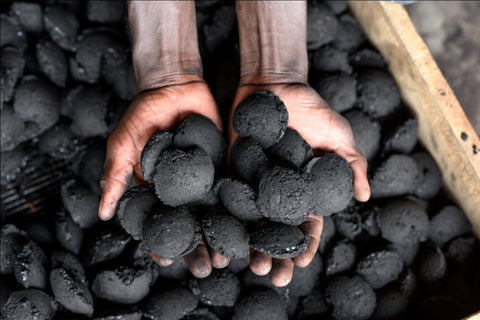Chimney VS Lighter Fluid VS Looft Charcoal Lighter: Let’s discuss the benefits of each and determine which option will leave you with a stellar grilling experience.
Index
- Introduction
- Difference Between Different Ways Of Lighting Charcoal
- Use of Chimney Starter
- Using Lighter Fluids
- Do you need lighter fluid for charcoal?
- How To Use the Looft Charcoal Lighter
- Summary
Introduction
Grilling season is upon us, and we could not be happier to get outside to prepare some delicious meals – from juicy steaks to corn on the cob to grilled shrimp skewers. Nothing compares to the taste of freshly smoked or grilled meats, especially when shared with family and friends at summer barbecues.
Charcoal grills work wonders to create that traditional smokey barbecue flavor that we all know and love. They are also a more affordable and portable alternative to gas grills that do not replicate those irresistible flavors. Although, the biggest question that comes when working with a charcoal grill is how to light it properly?
Though lighting charcoal grills may appear intimidating, it is relatively simple when using the appropriate fire starter. There are several methods you can try, including the use of charcoal chimney starters, lighter fluids, and of course, our Looft charcoal lighter.
If you are looking to learn which method to use for lighting your charcoal grill is best, you have come to the right place. We will cover the debate between two popular options – charcoal chimney starter vs. lighter fluid. In addition, try to understand how our stellar Looft charcoal lighter compares to these age-old methods.

Difference Between Different Ways Of Lighting Charcoal
Since charcoal grills are so versatile compared to other grills, there are many ways to start the grilling process. One of the most popular methods to start your grill is through the use of a charcoal chimney. The metal device is shaped like a cylinder that is filled with newspaper and charcoal to produce a flame. Notable grill masters have used this method for decades and know it is a surefire way to get your charcoal started.
Another commonly used tool for starting charcoal is lighter fluid, which is a flammable substance typically made with petroleum or alcohol. It is also a primary ingredient in many household lighters. This method is quite popular amongst grillers since it gets the charcoal started rather quickly with minimal effort. Although, the chemicals infused in this product can produce harmful effects when used incorrectly.
Lastly, our expertly crafted Looft charcoal lighter provides an easy yet productive alternative to starting charcoal. This innovative electric fire starter features fan-blown heated air to ignite a flame in just about sixty seconds. There are no flames, gas, or lighter fluid necessary when using this product. The Looft charcoal lighter is a simple, fast, and efficient way to start grilling yummy meals in no time.
You may also feel free to incorporate fire starters like pine cones or oiled paper donuts as an alternative if that is all you have on hand. This is an excellent option if you are stuck in a pinch without one of the above products but still want to grill some tasty meals.
Use of Chimney Starter
The first charcoal chimney starter was invented back in 1960 by three pitmasters - Garner Byars, Hugh King, and Lavaughn Johnson, as an alternative to lighter fluid. It is a much safer method that does not affect the overall taste of the food through harsh chemicals found in petroleum-based lighter fluid. Their invention has since become a staple for grill masters who whip us tasty barbecue food.

- This cylinder-shaped device is placed on top of lighter cubes, newspaper, or even wood chips on the grill.
- The chamber is then filled to the brim with charcoal to ignite the flame over time.
- The whole process takes about twenty to thirty minutes to start the charcoal. Although, certain charcoal chimney starters on the market may provide a faster experience.
Since the device has handles, removing the product off the grill is easy and safe without the risk of burning your hands. They are also super simple to clean and may be used as often as necessary. You may find charcoal chimney starters at most home goods stores in addition to online retailers like Amazon or Walmart.
Using Lighter Fluids
Lighter fluid is a popular tool for starting charcoal since it is fast and straightforward. The fluid contains flammable substances, such as petroleum, to create the fire over a bed of charcoal. When done correctly, this method takes approximately five to seven minutes, which is significantly shorter than using a chimney charcoal starter. You may have to reapply the liquid a few times after the initial start to maintain the flame.
Do you need lighter fluid for charcoal?
While this fire starter is a commonly used method, there are several pros and cons to using the chemical. One of the downsides to using this product is that it contains harmful chemicals, including butane (a type of liquid petroleum gas). It can infuse into different foods while cooking, leaving an unpleasant taste or residue. While most lighter fluid varieties contain petroleum, some on the market incorporate alcohol or plant-based oils as a more natural alternative. These lighter fluid substitutes may be much safer to use since they do not feature damaging chemical bases in their formulas.
Although it is important to note that if lighter fluid is misused, it can lead to severe injuries and burnt food. Worst case scenario kids are involved. It has actually been considered one of the leading causes of grilling related accidents over the years, with some individuals even burning off their eyebrows by overdoing it on the lighter fluid. The product should never be added to hot burning charcoal as it will result in a flare-up within seconds. Additionally, the petroleum featured in the lighter fluid can create an oddly flavored residue on food when overused.
If you decide to use this method for starting charcoal, after all, be sure to follow the instructions on the bottle carefully. Following the recommended steps will ensure the best possible results (and to keep your eyebrows safely on your face).

How To Use the Looft Charcoal Lighter
Our innovative electric charcoal lighter is a game-changer for the grilling industry. This easy-to-use product produces a flame in less than sixty seconds, which is incredibly fast compared to other fire-starting tools on the market. Its thin and compact design is also just as efficient since it is perfect for simple storage indoors. Looft offers two types, our original plugin lighter and wireless battery-powered lighter.
We recommend starting out by lighting smaller pieces of charcoal, allowing the glow to spread gradually to the larger parts without over-charring. This process will also produce a more even finish throughout the charcoal pieces. After placing the lighter directly on the small amounts of charcoal, you should pull it off once they are ignited. Carefully hover the product above the remaining charcoal, allowing it to continue to heat. At the same time, the glow spreads amongst the remaining pieces.
The heat setting will turn off after 2 minutes seconds if you’re using the Looft Lighter X. Then the fan setting alone will further spread the glow. It is such an effortless and quick process! As soon as you see an even flame going in your charcoal, you are ready to get started grilling.
The charcoal lighter was influenced by a vacuum cleaner and carefully crafted to reach temperatures of up to 1200°F, an ideal heat for starting charcoal. Looft’s founder, Richard Looft, came up with the idea for this product after a mishap at a family barbecue in which his grilled chicken tasted far too much like the lighter fluid that he used to start his charcoal. He tested out an idea using a vacuum cleaner and charcoal-filled toaster. And voila! His method worked and was soon brought to life with the formation of Looft’s electric charcoal fire starter.
Electric fire starters have grown in popularity in recent years, primarily due to their straightforward use and versatility. Not only can you use our lighter for charcoal grills, but you may also use it to start fireplaces, smokers, pizza ovens, and outdoor fire pits. It is a safe and simple method to avoid excess exposure to smoke. They are definitely an excellent and functional tool to keep on hand in your home, whether you grill occasionally or just about every week.

Summary
All in all, just about any of the three methods listed above can work well for starting up your charcoal grill. Charcoal chimney starters have reigned as a pitmaster staple for a reason. They get the job done in a safe yet productive manner. Although, this process does take a significantly longer time and requires more materials than other methods.
Even though it contains some pretty harmful chemicals, Lighter fluid is still a fast way to get your charcoal started. If you choose to use this method, please do so in a safe way to avoid any accidental mishaps and make sure kids are at a distance. Try to use a lighter fluid substitute, particularly those that include more natural or plant-based ingredients, for optimal results. Your guests at your next barbecue will thank you for keeping the gross flavors out of your grilled meats.
So, charcoal chimney starters vs. lighter fluid? While both methods do have their own benefits and downsides, it is clear that charcoal chimney starters are the safest option. The chemicals found in lighter fluid can be harmful when used incorrectly or for an extended time. Although, chimney starters do take a significantly longer time to get your grill going.
Finally, the Looft charcoal lighter is a fantastic tool to add to your collection. The electric fire starter boasts all the benefits the other methods have to offer – safety, speed, and ease of use – all in one compact device.




